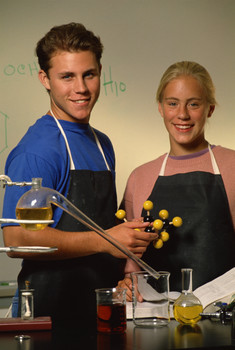
My 7th grade daughter is looking for some FUN science - not just busy work. I wondered what you would suggest to whet her appetite more than I am doing now. We have been using a science experiment kit which cost a lot and came complete with 50 different 'FUN' (or "easy to fail") experiments, all based around earth science, biology and a bit of physics. It seemed to be a good year's worth of interest. How spectacular are our failures.... I am open to ideas....
~ Paula
Dear Paula,
It depends on what your daughter thinks is fun! I don't know her, so I can't even begin to guess what she would like, but I do have an idea where to start. It may be as easy as switching curriculum.
Why don't you look through the HomeTrainingTools website, and have her choose something?
Or look at TOPS.
Or Rainbow Science.
Instead of buying a curriculum, you can draw outside the box. Science can be learned in many ways: doing experiments, reading, watching, and writing. When my children were younger, I was very inconsistent with experiments, because they didn't seem to enjoy them. But they did learn a lot about science by reading books.
Group together things that interest her and call it a unit study. For example, if she is vaguely interested in going to the beach, you could create a marine biology unit study. Read books about the ocean, some literature about the ocean, go to the Aquarium a few times, and visit the beach a few time.
Instead of thinking about science in terms of experiments, think about science in terms of books. She may prefer to learn about science through reading. You might tell her to go to the library and choose 1 science book per week, on the topic of her choice. Read about science topics, general science books like Usborne books, or read about scientists: Marie Curie, Thomas Edison, Da Vinci, etc.
Instead of reading about science, consider writing about science. A child who like research may want to write their own notebook about different science topics. You could have her research 1 page per week of any science topic of her choosing. Keep a journal of what she learns.
Some visual learners do very well by watching videos about science. Nature shows and science movies can make science very fun and exciting for visual learners. After you complete a video series in a topic, you might find a hands-on experience at a zoo, or bird-watching or something.
Don't think science is just biology, chemistry and physics. Particularly in middle school, there is no limit on the topics. Nature study, birds, bugs, astronomy, horses, 4H, volcanoes, computers, marine biology, ecology, botany, and microscopes. (I'm just brainstorming here, and I can certainly tell I'm a nurse, because most of this is biology-related!) Chemistry kits, creation science, first aid, and geology.
Mostly, it's about getting her input, trying to find something relatively fun. Your goal is for her to think science is OK, not hateful, boring, or hard. Junior high is a time to create a positive attitude about science, and then they can be more successful in high school. She is still young, so content doesn't matter as much. Right now it's about teaching her to like it!

Join me on Facebook!